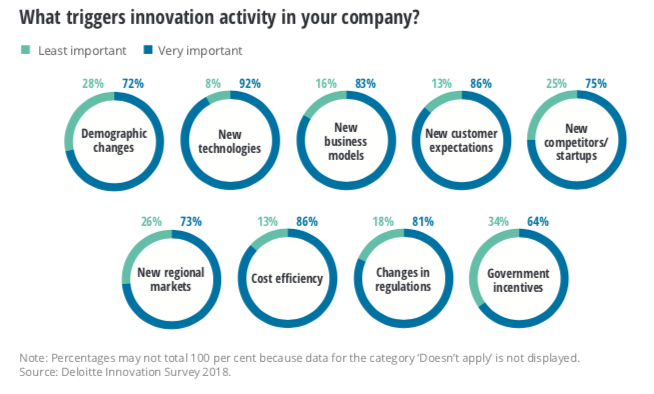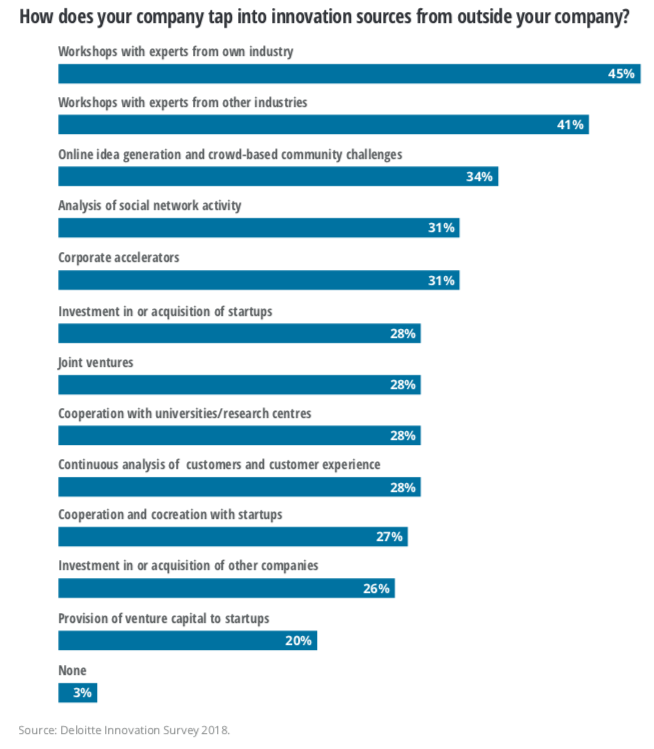Big European companies talk a lot about startups and innovation, but the majority of the work seems to be what Scott Campbell, director of Deloitte Ventures, calls "innovation theatre", i.e. innovation work that is being done to showcase that some kind of innovation is happening, but which doesn't generate any tangible outcomes.
Deloitte carried out a survey about corporate innovation, where they talked to 760 large companies across 16 countries. Here are some of the key takeaways, that support the notion that corporates care more about "innovation theatre" than actual innovation.
1. Startups trigger innovation
76% of corporates asked in the survey believe that “new players and disruptors” have a very important influence on their own business activities, and the same percentage say that startups trigger innovation within their company. In short, Europe's large companies are paying a lot of attention to what startups are up to.

2. But the corporate world is not taking action
The survey also found that in practice, the inspiration to innovate is not taken into concrete action, with corporates talking a lot more about engaging directly with disruptors than actually engaging with them (hence the innovation theatre remark). Companies prefer to run workshops with experts from within their own industry, or even browse social media for innovation resources, rather than invest in startups, cooperate on projects with startups, or provide venture capital to startups.

Many companies run workshops and events which seem innovative, Campbell says, but fewer companies have a clear strategy for innovation and are really open to disruption.
“Working with startups is hard – it requires a total shift in how a company approaches data security, human resources and company policies,” he says. “Innovation theatre is much easier.”
More than half of the companies surveyed across all sectors are currently trying to implement new technologies, like the Internet of Things, robotics, artificial intelligence, virtual reality and blockchain.
Experts in disruptive technologies are more likely to be found at tech startups than within traditional industries, and companies do seem to recognise the need to look further afield to really make use of these tools; almost all the respondents (92%) said that external influences at least as important as internal capabilities, with a third saying external resources are more important.
Yet most companies in Europe are pushing ahead on their own.
Without a clear strategy, it's just innovation for innovation’s sake. It’s misleading, and startups are going to get burned out.
“European companies are yet to realise the relevance of ecosystems,” wrote the report authors, chief innovation officer of Deloitte Germany Nicolai Andersen, chief economist Dr Alexander Boersch, and Deloitte’s sustainable innovation expert Dr Julian Blohmke.
“No method or process is used heavily by European firms to tap into innovative sources from outside the firm. This means European companies are yet to realise the relevance of ecosystems to the future of their business.”
How does it vary across country and sector?
Deloitte’s researchers said that Europe’s companies need to recognise that “the best talent does not always work in the company”.
“Digital ecosystems provide richer connections that enable companies to gain access to new knowledge faster and incorporate change more effectively,” they said.
“Failing to access outside inputs fully means European businesses are not realising their full potential.”
But Deloitte Ventures’ Scott Campbell says it is vital for companies to have a clear strategy if they are going to engage startups.
“Many companies say they are increasing their spend on innovation but without a clear strategy, it is just innovation for innovation’s sake,” he says. “It’s misleading, and startups are going to get burned out.”
For further reading on innovation theatre, check out Jeremy Basset's piece on why corporate startup partnerships don't work.



